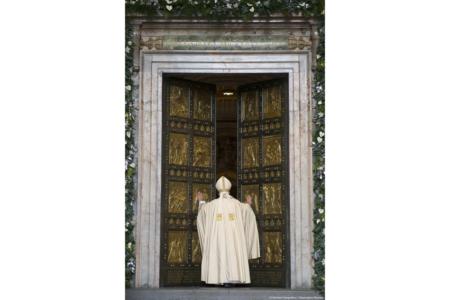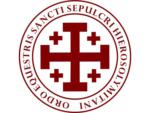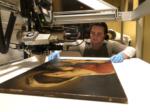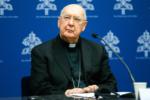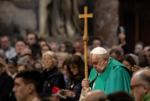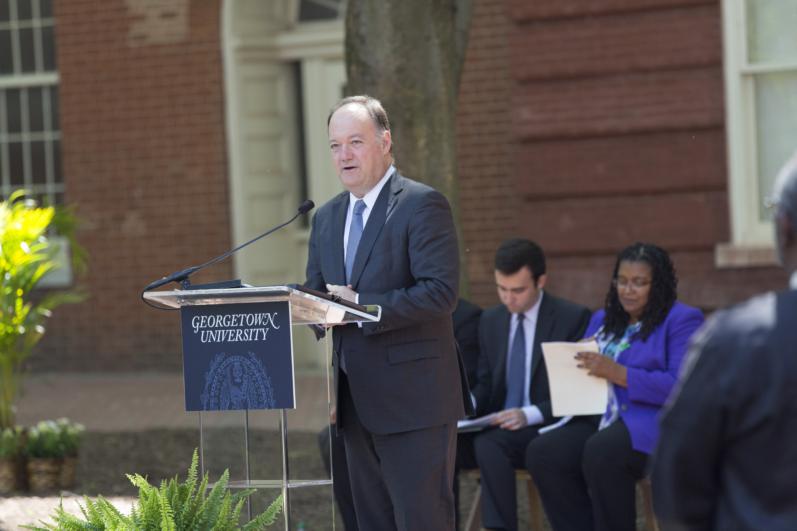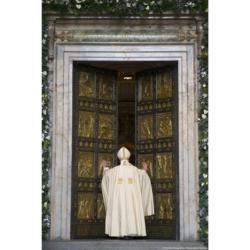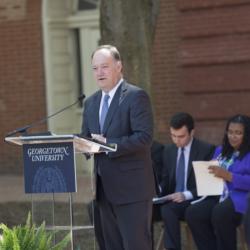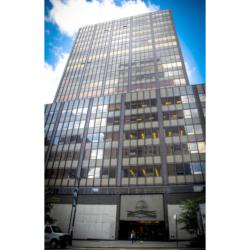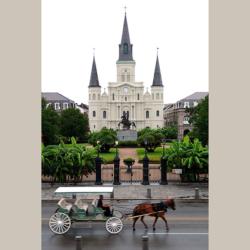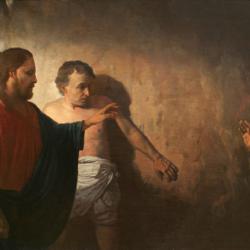Georgetown U. president steps down for health reasons in 'most difficult decision' ever
(OSV News) -- The longest-serving president of Georgetown University will step down after 23 years for health reasons.
John J. DeGioia said in a Nov. 21 letter informing the school of his decision that the move was "the most difficult decision I have ever made."
The first layperson to lead a Jesuit institution of higher education in the U.S., DeGioia had suffered a stroke in June, and said in his letter, "I will need to devote my energies to my ongoing recovery."
He will transition to the role of president emeritus, and will remain a member of the faculty, the university said in a Nov. 21 announcement.
The school's provost and executive vice president, Robert M. Groves, has been appointed as interim president, with the board launching a search for DeGioia's replacement.
The school's board chair, Thomas A. Reynolds III, said in a Nov. 21 letter that "it is hard to put in words the depth of Jack's impact at Georgetown."
DeGioia, who holds two degrees from the school -- a bachelor's degree in English and a doctorate in philosophy -- "has spent his entire career at Georgetown and has helped shape every facet of the University," said Reynolds.
Prior to his appointment as president of Georgetown University in 2001, DeGioia had held a variety of senior administrative positions at the school, previously serving as senior vice president and dean of student affairs.
Reynolds said in his letter that under DeGioia's leadership, the school "has grown and flourished as a global leader in higher education."
"With a deep commitment to academic excellence, research, student formation and its Jesuit and Catholic identity, Jack has helped to position Georgetown as a force for good in the world," he said.
DeGioia's presidency saw the school advance its academic and research programs, as well as its social engagement initiatives and its Catholic, Jesuit identity.
In 2013, the university opened the McCourt School of Public Policy, its first new school in 60 years, which moved a decade later into a new landmark building on Georgetown's developing Capitol Campus, located in downtown Washington.
Also in 2013, DeGioia helped to establish Georgetown's Initiative on Catholic Social Thought and Public Life, which promotes dialogue across diverse political, religious and ideological lines, while encouraging young Catholic lay leaders in their faith.
Shortly after becoming president, DeGioia created executive oversight for spiritual development on campus, naming a vice president for mission and ministry to enhance the university community's appreciation of Ignatian spirituality.
In addition, DeGioia nurtured strong ties with the Catholic Church, meeting annually with Catholic and Jesuit leaders in Rome, developing partnerships with the Vatican, and hosting campus events to mark milestones in the church's history and mission.
DeGioia's tenure also saw the 2006 founding of the school's Berkley Center for Religion, Peace, and World Affairs, which promotes intercultural and interreligious understanding, including among Muslim and Christian theologians, with a focus on the common good.
Similar efforts under DeGioia include the renovation of its chapel and crypt; the creation of sacred spaces on campus for Jewish, Muslim and other faith traditions; and the opening of the off-campus Calcagnini Contemplative Center for faculty, staff and student retreats.
During his tenure, DeGioia also worked to address the university's history of slavery and its role in the slave trade.
In 2015, DeGioia convened a working group of faculty, students, alumni, and staff to recommend ways to acknowledge the university's history. That year Georgetown also stripped from a building the name of one of its past presidents, Jesuit Father Thomas Mulledy, who authorized the sale of 272 women, children and men -- slaves sold to save the university from financial ruin in 1838. Mulledy Hall was renamed Isaac Hall, taking the first name of the slave first listed in the sale documents.
Another building, originally named after Jesuit Father William McSherry, who was also involved in the 1838 sale and in others slave sales, was renamed Anne Marie Becraft Hall, a free woman of color who founded a school for black girls in Georgetown in 1827 and later joined the Oblate Sisters of Providence in Baltimore.
In 2016, with descendants of the slaves sold watching nearby, DeGioia formally apologized for the university's past actions. "There were two evils that took place," he said. "The sale of slaves and the breakup of families."
DeGioia also bolstered Georgetown's financial aid budget, which reached $285 million in 2024 and which provides about half of the school's undergraduates with aid. The Georgetown Scholars Program, launched in 2004 to provide what the school calls "wraparound support" for first-generation and low-income students, has so far served more than 2,600 students.
Last year, Georgetown became the first Catholic, Jesuit university to establish a disability cultural center.
"Serving as the President of Georgetown has been the privilege of my lifetime," said DeGioia in his letter. "I look forward to continuing to advance and support Georgetown's mission and the University community that means so much to all of us. I remain deeply proud of the work we have done together to strengthen the Georgetown community, our nation, and our world."
- - - Gina Christian is a multimedia reporter for OSV News. Follow her on X (formerly Twitter) @GinaJesseReina.
